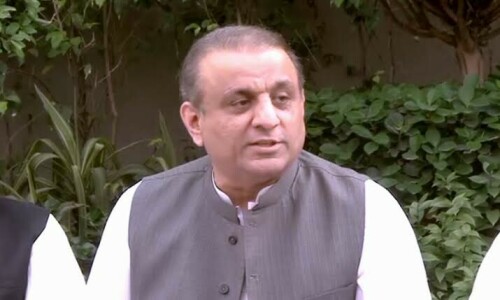WASHINGTON, Dec 24: The United States has said that while it supports the democratic process in Pakistan, it desires a 'closer, more productive relationship' with both civilian and military authorities.
At a briefing at the State Department, spokesman Mark Toner refused to get involved in the current civilian-military dispute over the so-called memo scandal.
Instead, he emphasised the significance of US-Pakistan relations, saying that this partnership was too important to be allowed to fail.
Although he faced a series of loaded questions that gave him enough room to take a clear stance in favour of, or against, either the civilian or military positions on the 'memogate'; Mr Toner decided not to do so.
Journalists attending the briefing explained the background of the current crisis, reminding the US official that until Thursday, it seemed as if the military was trying to oust President Asif Ali Zardari. The military,however, has rejected such reports as speculative, assuring the civilians that they would continue to support democracy.
'Would you rather not see this kind of speculation that military officers quoted as saying that they want to see Mr Zardari go?' asked a journalist.
'We support the democratic process in Pakistan, we support the constitution and the rule of law, as well as the will of the Pakistani people, Mr Toner responded.
But 'we believe that this is a matter for the Pakistani people to resolve within their own political process,' he added.
The journalists tried another, a more generalised, approach.
The year 2011, started with the Ray Davis episode and was ending with a bitter dispute over the Nov 26 Nato air strikes that killed 24 Pakistani soldiers.
'Do you think it is fair to say that this was probably the most troubled year in the relationship?' askedone of them.
'I never like to deal in absolutes or generalisations.
We've been, I think, pretty candid in saying that there have been some significant obstacles throughout this year in the relationship,' the State Department official said.
'But at each juncture, we've tried to address those challenges and we have recommitted ourselves to working with Pakistan. And we're going to continue to do that because we believe we need to work with Pakistan.
It's too important.
'The issues that we face, the challenges we face, are too important.
'How confident are you that 2012 will be better than 2011?' asked the journalist.
'It's hard to say what's going to happen over the next year.
'All I can do is to speak on behalf of the US, and that is that we desire a closer, more productive relationship with Pakistan both militarily and as well as politically,' said the US official.















































Dear visitor, the comments section is undergoing an overhaul and will return soon.